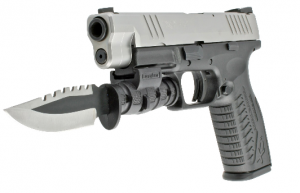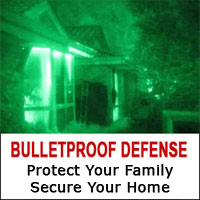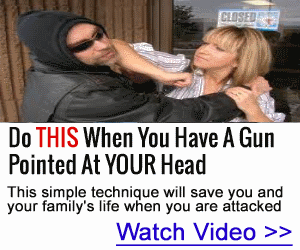 It’s very easy to get caught-up and become distracted by all the fun prepping toys. The blogs are choked with articles about guns, knives and survival gear.
It’s very easy to get caught-up and become distracted by all the fun prepping toys. The blogs are choked with articles about guns, knives and survival gear.
However, the single most important consideration in prepping is you! Your health and well being is by far the most important consideration there is in any survival situation.
Short-term situations are important, but it’s the long-duration disaster scenarios that present the most serious challenges to the majority of people today. The long-term challenges are what will separate the men from the boys, and the survivors from the casualties.
Here’s the deal: everyone (Preppers included) are psychologically conditioned over years of daily behavior to assume the ‘little things’, which are ubiquitous in our daily lives, will be conveniently there at the moment we want them. Whether we like it or not, we have become a society of ‘instant gratification’. When it comes to things like a pair of sunglasses, or a new pair of tennis shoes… we simply expect to be able to drive a mile or two in our vehicles and choose from a hundred pair. If you’re not prepared right now, then you might be ‘toast’ in a disaster.
In a real disaster or post-disaster scenario, the things that will likely kill or injure you or a loved-one may not be the ones you might expect.
A Few Often Overlooked Risks That Many People Are Not Prepared For:
urns: Burns are a common injury, especially sunburn. In survival mode, the opportunity for getting a first, second or third degree burn (or worse) may be increased through; being in an outdoor environment more than usual and, through the use of alternative cooking methods, to which we are unaccustomed. Most people, even those with First Aid kits do not have the proper (preferred) treatment for a serious burn, which can be life threatening if infection sets in. Burns are problematic; even a very small 2nd or 3rd degree burn can become lethal if not properly treated, and having to depend upon antibiotics if infection sets-in is not optimal. Serious burns are extremely painful and may require analgesics that are significantly stronger than over-the-counter pain relief. In most cases, you’ll want to treat a serious burn with Silvadene Cream (Silvadene® CREAM 1% silver sulfadiazine) and carefully maintain the dressing on the burn. Minor burns, such as sunburn (1stdegree burns) may be treated with alternative methods such as the use of Aloe or Silver Sol and other naturopathic methods.
Cuts, scratches and insect bites: It seems that it’s the little things that can creep up on you and get the best of you when you’re least expecting it. Even the smallest breaks in your protective skin-barrier will allow bacteria to infiltrate and cause infection. Insect bites are problematic due to the fact that people will often scratch the bite, and the dirt and bacteria from underneath untrimmed fingernails can be introduced into the bite. Staph infections and septicemia are no joke. Sepsis can originate anywhere bacteria can enter the body; quite commonly through broken or ulcerated skin. It’s very important to immediately clean any such breaks in the skin (including insect bites) with a good disinfectant or soap and then apply an antibiotic ointment (I like Polysporin). In situations where time is of the essence, you can simply remove any obvious debris and apply the ointment and dress the site as necessary.
Lack of Foot care: Your feet are more important than you can imagine. When this fact is mentioned, it seems all too obvious. Nonetheless, most military inductees quickly learn what they didn’t realize about this fact. And they do so only because they suddenly find themselves on their feet and walking distances with backpacks, day after day. This is exactly what may happen during or after a disaster. People today don’t normally walk all day with a load on their back, let alone for days. So when they do, their feet, which are unaccustomed to that level of use, react with blisters and other issues. Proper foot care cannot be over stressed; just ask any experienced military operator with field experience.
You need to keep your feet as clean and dry as possible. Toe nails must be kept properly trimmed. I see far too many people who do not, for whatever reason, keep their toe-nails properly trimmed (whatever it takes, get it done). Toe nails that are too-long create issues such as mechanical interference with your footwear, as well as harboring dirt, moisture, fungus and bacteria under the nail. Keeping them properly trimmed minimizes these issues.
Of primary importance is obtaining quality footwear that is designed for the intended use. Tennis shoes are not suited to supporting your feet and ankles while hiking with equipment and packs. You will require proper boots that are fitted and broken-in. Good quality socks are also important and you will want several pairs so you can cycle them in order to keep your feet dry and clean. Using a good quality foot powder or spray will also be beneficial in preventing various fungus growths.
Environmental Exposure: We all know we need to maintain our body temp within an acceptable range in order to survive, hopefully with some comfort. However, when you’re suddenly thrust into an unexpected situation, you may find that it’s suddenly not so easy. Most people living on the North American continent are subject to a wide range of seasonal temperatures, so it makes sense to utilize the modern high-tech compact fabrics, which have a host of excellent features (good insulation, blocks wind and rain, moisture can escape), which also allow layering to support comfort in a wide range of thermal conditions. I think most people have a good grasp on basic survival clothing… exposure to the sun is a bit trickier…
During or after a disaster, you may not have proper shelter or you may suddenly be outdoors for considerable periods of time. Most people aren’t use to being out in the sun for long periods, so their skin is not accustomed to the extra U.V. exposure. If you’re properly clothed, you can still get over-exposed to U.V. on your face, ears, lips, nose, scalp and possibly your arms and hands, as many people do on a regular basis. In survival mode, you cannot afford what might be only a minor problem under normal circumstances. Forget the banana boat sun-tan creams; instead buy a tube of zinc oxide cream, it’s cheap, effective, and has additional uses.
Source : www.survivalbased.com



I hear you. Feet are the most important during a survival period.
Having trouble walking is hard to stay alive.